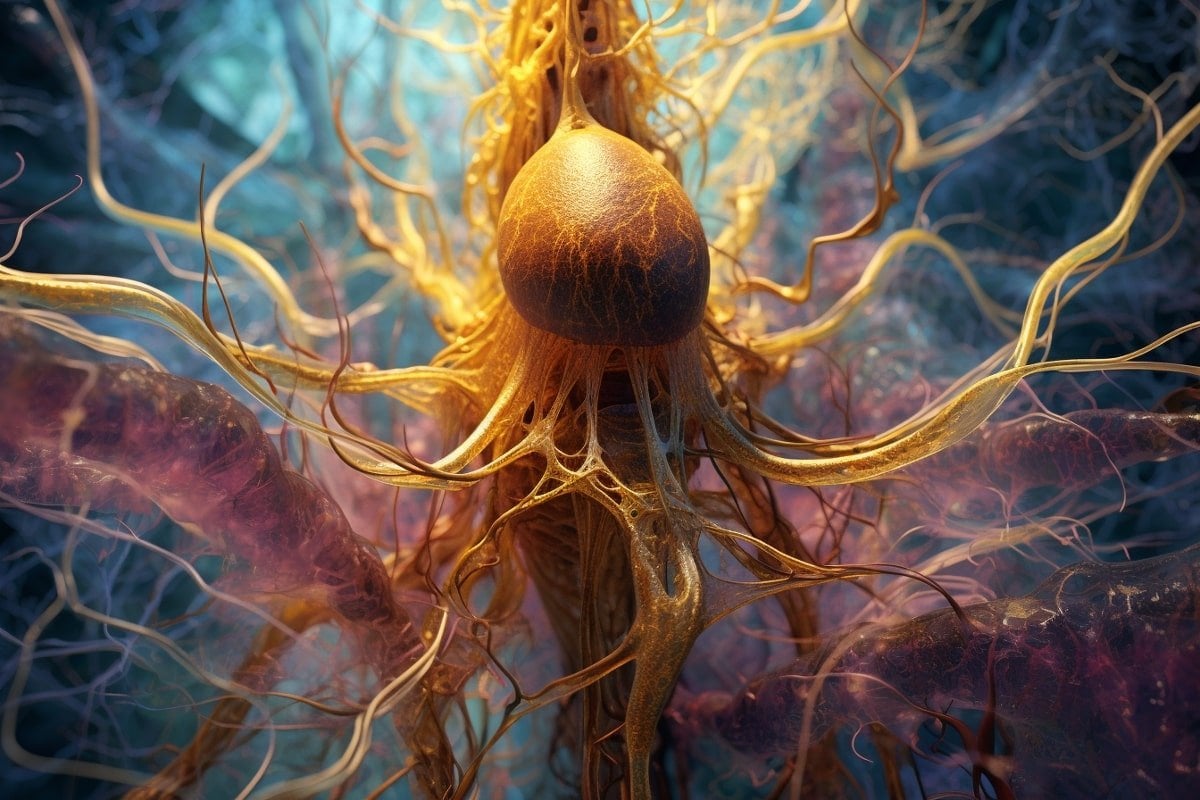Summary: Recent research illustrates a protective effect of progesterone on the enteric nervous system (ENS), often referred to as the body’s “second brain”. The study demonstrated that nerve cells treated with progesterone were more resistant to conditions simulating Parkinson’s disease.
This discovery suggests progesterone receptors in the ENS may have crucial roles in neuroprotection. It opens up the possibility for new, steroid hormone-based treatments for neurodegenerative diseases.
Key Facts:
- The enteric nervous system communicates closely with the central nervous system, influencing neurological diseases like Parkinson’s and Alzheimer’s, and even depression.
- Dietary influence on the intestinal microbiome can affect the central nervous system via the gut-brain axis, possibly promoting diseases like Parkinson’s.
- The study revealed that progesterone has a protective effect on the nerve cells of the ENS, providing insights into the potential therapeutic uses of steroid hormones in neurodegenerative diseases.
Source: RUB
The enteric nervous system (ENS) is a complex network that stretches along the entire gastrointestinal tract. It consists of about 100 million nerve cells, autonomously controls digestive processes and is often referred to as the second brain of humans. But its function is much more than digestion: recent research has shown that the ENS communicates closely with the central nervous system (CNS), i.e. the brain and spinal cord.
“The communication between the ENS and the CNS is currently associated with the pathogenesis of various neurological diseases such as Parkinson’s disease and Alzheimer’s disease, as well as depression,” explains Professor Carsten Theiß, Head of the Department of Cytology at Ruhr University Bochum. The gut-brain axis is not a one-way street; both nervous systems influence each other.

A person’s diet has a direct impact on the intestinal microbiome, which in turn interacts with the ENS. Studies show that the composition of the microbiome can also affect the CNS via the gut-brain axis, especially via the vagus nerve, and promote diseases such as Parkinson’s disease.
A balanced diet can therefore not only contribute to the preservation of nerve cells in the intestine, but may also delay Parkinson’s disease for many years or even prevent it entirely.
The protective effect of progesterone
Medical doctoral students Paula Neufeld and Lennart Stegemann have now successfully demonstrated a protective effect of the natural steroid hormone progesterone on the nerve cells of the ENS.
In a series of experiments, the duo cultivated nerve cells from the ENS over several weeks and treated them with a cell toxin to simulate harmful conditions similar to Parkinson’s disease.
They found that the nerve cells that were additionally treated with progesterone died significantly less frequently than the untreated cells.
Paula Neufeld points out the significance of their discovery: “Our research provides important insights to complete our basic knowledge about the role of progesterone receptors in the enteric nervous system. This opens up completely new avenues for studying the neuroprotective mechanisms of action of progesterone inside and outside the intestinal tract.”
Lennart Stegemann adds that “this study could potentially pave the way for new steroid hormone-based therapeutic approaches. There is also hope that steroid-based therapeutic approaches could help to slow down or even stop neurodegenerative diseases”.
Cooperation partners
The paper is the result of collaboration and well-established translational research between the Department of Cytology headed by Professor Carsten Theiß at the Ruhr University Bochum Medical Campus and Professor Matthias Vorgerd, senior consultant at the Clinic for Neurology at the BG University Hospital Bergmannsheil in Bochum.
About this neurology research news
Author: Meike Driessen
Source: RUB
Contact: Meike Driessen – RUB
Image: The image is credited to Neuroscience News
Original Research: Open access.
“Progesterone: A neuroprotective steroid of the intestine” by Carsten Theiß et al. Cells
Abstract
Progesterone: A neuroprotective steroid of the intestine
The enteric nervous system (ENS) is an intrinsic network of neuronal ganglia in the intestinal tube with about 100 million neurons located in the myenteric plexus and submucosal plexus. These neurons being affected in neurodegenerative diseases, such as Parkinson’s disease, before pathological changes in the central nervous system (CNS) become detectable is currently a subject of discussion.
Understanding how to protect these neurons is, therefore, particularly important. Since it has already been shown that the neurosteroid progesterone mediates neuroprotective effects in the CNS and PNS, it is now equally important to see whether progesterone has similar effects in the ENS.
For this purpose, the RT-qPCR analyses of laser microdissected ENS neurons were performed, showing for the first time the expression of the different progesterone receptors (PR-A/B; mPRa, mPRb, PGRMC1) in rats at different developmental stages. This was also confirmed in ENS ganglia using immunofluorescence techniques and confocal laser scanning microscopy.
To analyze the potential neuroprotective effects of progesterone in the ENS, we stressed dissociated ENS cells with rotenone to induce damage typical of Parkinson’s disease.
The potential neuroprotective effects of progesterone were then analyzed in this system. Treatment of cultured ENS neurons with progesterone reduced cell death by 45%, underscoring the tremendous neuroprotective potential of progesterone in the ENS.
The additional administration of the PGRMC1 antagonist AG205 abolished the observed effect, indicating the crucial role of PGRMC1 with regard to the neuroprotective effect of progesterone.






